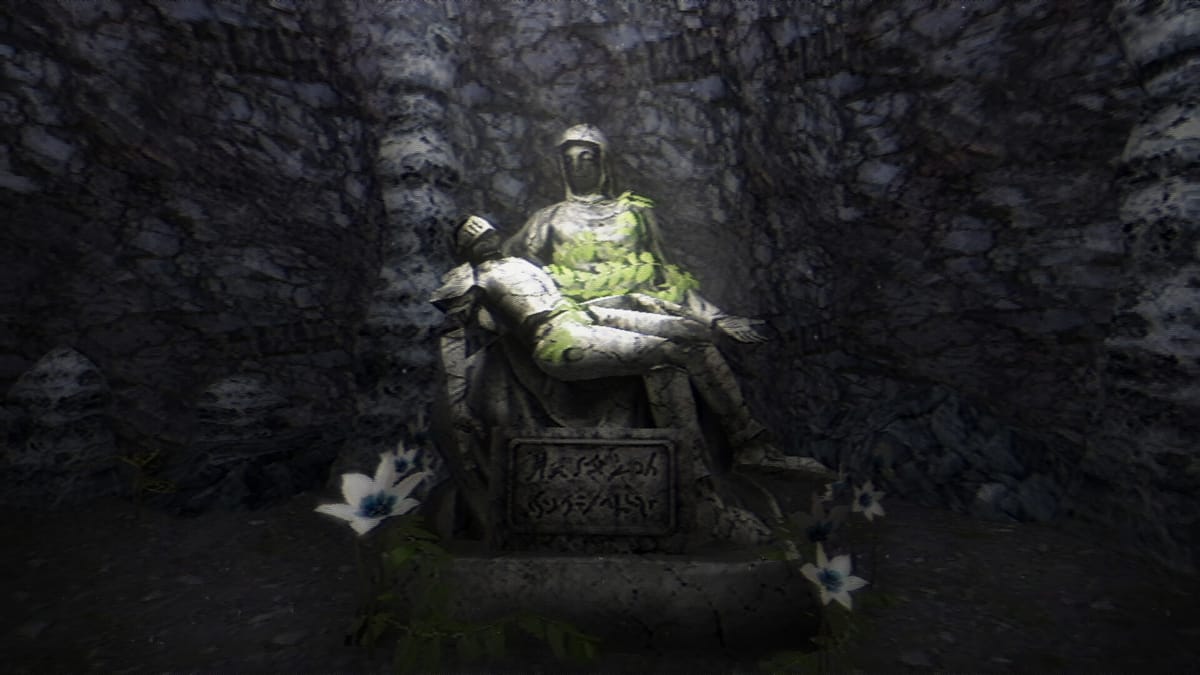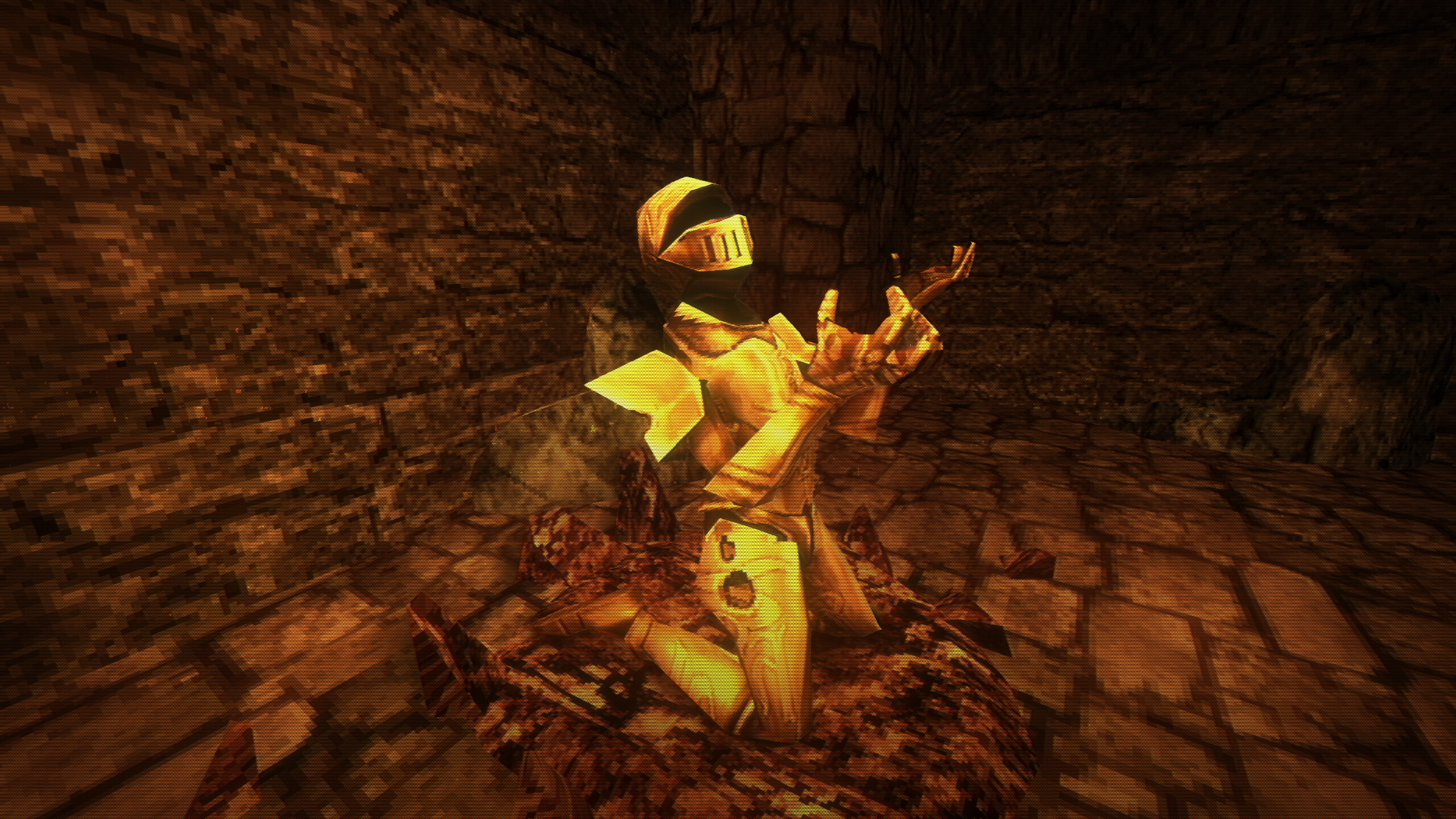Haunting, mysterious Lunacid is one of the best sub-$15 games you can get on Steam
You can summon coffins out of thin air and stack them up to climb where you aren't meant to go.

Well gamers, papa Jake has once again popped around the proverbial corner for some smokes, leaving this newsletter in the less-than-capable hands of your weird uncle Ted (that is to say Jake's friend and coworker, PC Gamer associate editor Ted Litchfield). This means it's once again time for a less-than-relevant writeup of a weird indie game that really stretches Hit Reload's FPS-focused remit.
Lunacid is a first person RPG in the mold of FromSoftware's primeval King's Field series, but this is a subgenre I've always felt had FPS sicko crossover appeal by way of Ultima Underworld or Metroid Prime, that specific vein of first person game where navigation and discovery take priority over combat, stealth or overt storytelling—Lunacid feels almost as much like System Shock as it does Dark Souls. Also, crucially, I've only just gotten around to playing this 2023 release on my Steam Deck, so the stars aligned for a deep dive.
From the jump, Lunacid has the juice, that intangible sense of care, creativity, and attention to detail that distinguishes a truly excellent retro throwback game from the legions of just ok ones. Writing for PCG, Kerry Brunskill hit the nail on the head pointing out how Lunacid's oversized menus look like they were meant for a low-res CRT rather than a modern flat panel. The music and UI sound effects have a sensibility I can only describe as "Resident Evil Save Room-core," a primal je ne sais quoi of PS2ness. Symphony of the Night's OG Alucard VO, Robert Belgrade, shows up to voice both the narrator and a major story character.
So Lunacid has that sense of authentic, deeply-felt love and knowledge you need to evoke nostalgia for another time and place, but it's not just some slavish imitation—another common pitfall among retro-oriented indies. Lunacid creator Akuma Kira had a sense of scope and vision for this project, and the entire time I was playing I felt this overriding sense of tension and isolation, being lost in another world where I didn't belong.
In every zone of Lunacid's interconnected, 3D metroidvania world, I was constantly weighing the risks of pressing on versus turning back to a save point, audibly exclaiming "oh my god, there's more to this place?" as I rounded a corner to another set of diverging paths. At its most extreme, Lunacid has that sense it could have been a playground rumor legend if it had come out before the internet, like Elden Ring's hidden endings with Ranni and the Three Fingers.

One zone stretches deep underground into a haunted mausoleum where, if you linger too long, an invincible reaper spawns to hunt you down. It can be killed with a weapon forged from components that only appear in the game on the day of a full moon in real life, one of several systems tied to our IRL lunar cycle.
Your reward is Death's Scythe, one of the most powerful weapons in the game, but also waves of infinitely spawning, unsettling new enemies in every area, as well as the retreat of most of Lunacid's friendly NPCs into some kind of hidey hole where you can't follow. This strange, deeply hidden mechanic is part of the process to unlock one of Lunacid's endings, which is coincidentally its most horrific. Like Undertale's "genocide" evil playthrough or Elden Ring's Frenzied Flame ending, your reward for completionism, for gamer instincts, is utter horror.
The combat in Lunacid is clunky and kind of an odd duck, but I took a shine to it. Your basic loop is that Elder Scrolls/King's Field/Ultima Underworld shuffle: Winding up a power attack, bonking an enemy, then backpedaling to avoid their counter swing. Character builds, rather than serving a preference-based class fantasy, are more about securing the widest possible toolbox to deal with enemies and other challenges.

Lunacid is built around an elemental weakness system, with each weapon dealing a certain type of damage (normal, light, dark, fire etc.) and each enemy having its own spread of resistances and weaknesses. I ultimately leveled my character into a generalist rather than some kind of min-max build. Dexterity and Speed are king, allowing you to eventually move and jump like a boomer shooter protagonist, but while Dexterity-powered ranged weapons are always useful and especially strong early on, the pool is limited in terms of available elemental damage types, so you have to branch out into melee weapons or offensive magic.
No matter what, you'll want to invest in at least some Intelligence to use Lunacid's puzzle-solving and traversal-oriented spells. The king, the GOAT, is Summon Coffin, which does exactly what it says on the tin with no limits to how many can be brought into the world at once. Lunacid doesn't really have complex systemic interactions as such, but it is an immersive sim in the radical revisionist definition: You can stack up crates coffins to climb places you theoretically aren't supposed to, and I think that's beautiful.
On a final note, I have to shout out the soundtrack in more detail: It's mostly great, PS2-appropriate dreamy ambiance, but then the Forbidden Archives level has two dancey bangers out of nowhere by YouTuber and guest musician ThorHighHeels. Book Betrayal starts out slow and thoughtful, but then the beat has this arresting drop that transitions into some groovy funk. Dead Department, meanwhile, spins a similar soundscape into this propulsive, driving track that's just perfect to fight floating brain-eye-spinal cord guys to at 60 miles per hour.
Oh, and the brain-eye-spinal cord guys are the missing link to the faceless zombie guys you fight way earlier in the game. Now that's what I call environmental storytelling. Play Lunacid.
Gibs
- The last time I was here I joked that no one would want to play Marvel Rivals. Boy do I have egg on my face. Not only did this result in Jake's first angry email from a reader, Marvel Rivals is currently bigger than Jesus.
- Nightdive's System Shock 2 remaster has finally resurfaced and is looking pretty fresh. I've already been jonesin' for a replay of what is hands-down Irrational's best game, but also find myself pondering a Kex Engine uplift of its Dark Engine siblings, Thief and Thief 2. Unbroken mod support would be critical with Thief's legendary community and library of fan missions (notably 2023's slobberknocker full-length prequel, The Black Parade), but there's precedent: Nightdive's own Doom and Quake ports managed to be mod-friendly (Quake more than Doom, from what I hear), while Beamdog's Neverwinter Nights and Infinity Engine enhanced editions have had perfect mod compatibility in my experience.
- Ultrakill got a full visual overhaul, and it looks great! I love Ultrakill and Gloomwood, but it's killing me to keep away from them during early access—I find I can burn out on a game playing it piecemeal. Early access is undoubtedly a godsend for devs, but I've never been partial to it as a player. Larian's single sandbox act of a much larger game model might be the only variation I can really enjoy rather than just tolerate.
